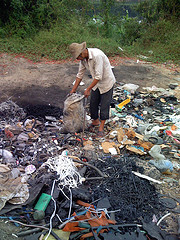














Dumping
E-Waste on Other Countries
Many of the computers that we throw away, even some that we take to “computer recyclers” are
 shipped
overseas to developing countries in Asia and Africa. In fact, 70% of
e-waste is now sent to China for recycling [34]. Even though Canada is a signatory of the Basel Convention, a
treaty that prohibits the shipping of hazardous waste to developing
countries [35], much of our e-waste ends up in places such as
Guiyu, China; the profit to be had from this practice has created a
thriving illegal trade in e-waste [36]. If you would like to
watch an in-depth report on this illegal trade you may follow this
external link to “E-waste Dumping Ground,” a CBC
National news report (runs 18:53).
shipped
overseas to developing countries in Asia and Africa. In fact, 70% of
e-waste is now sent to China for recycling [34]. Even though Canada is a signatory of the Basel Convention, a
treaty that prohibits the shipping of hazardous waste to developing
countries [35], much of our e-waste ends up in places such as
Guiyu, China; the profit to be had from this practice has created a
thriving illegal trade in e-waste [36]. If you would like to
watch an in-depth report on this illegal trade you may follow this
external link to “E-waste Dumping Ground,” a CBC
National news report (runs 18:53). In places such as Guiyu, individuals break electronic components down into component parts without any protective clothing or masks. Circuit boards are often burned or put in acid baths to extract the precious metals from them. This creates toxic fumes and ultimately poisons the local environment, making the water undrinkable and contaminating the soil. If you wish to view a CBS special report on e-waste in China, click the YouTube video below to see CBS reporter Scott Pelley tour Guiyu, China with Jim Puckett of the Basel Action Network (runs 1:48).
http://www.youtube.com/watch?v=IhNInIqu2hM
Of course, soil is not the only thing that can be contaminated. A recent study published by the American Chemical Society analyzed breast milk from young mothers at both a recycling site and a reference site and found levels at the recycling site of dioxin and dioxin-like PCBs which are linked to cancer, developmental defects, and other health problems to be at least 25 times higher than the World Health Organization daily tolerable limit for adults [37]. If you wish to view more of the CBS special report on e-waste in China, click this YouTube video to see CBS reporter Scott Pelley interview Scientist Dr. Anna Leung concerning lead levels in Guiyu (runs 2:27).
http://www.youtube.com/watch?v=VIeOeX_zTWI
As horrible as the e-waste disposal situation is, there are reasons to be hopeful. Click to the next page to learn about BAN, EPEAT, RoHS, and WEEE.

LIBR 500: Foundations of Information Technology, School of Library, Archival and Information Science, University of British Columbia
Neil MacDonald
November 17th, 2008